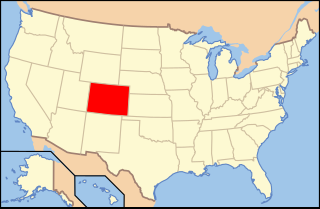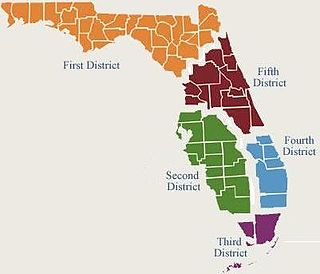
Article Three of the United States Constitution establishes the judicial branch of the federal government. Under Article Three, the judicial branch consists of the Supreme Court of the United States, as well as lower courts created by Congress. Article Three empowers the courts to handle cases or controversies arising under federal law, as well as other enumerated areas. Article Three also defines treason.

The New Hampshire Supreme Court is the supreme court of the U. S. state of New Hampshire and sole appellate court of the state. The Supreme Court is seated in the state capital, Concord. The Court is composed of a Chief Justice and four Associate Justices appointed by the Governor and Executive Council to serve during "good behavior" until retirement or the age of seventy. The senior member of the Court is able to specially assign lower-court judges, as well as retired justices, to fill vacancies on the Court.

The Judiciary Act of 1789 was a United States federal statute adopted on September 24, 1789, in the first session of the First United States Congress. It established the federal judiciary of the United States. Article III, Section 1 of the Constitution prescribed that the "judicial power of the United States, shall be vested in one supreme Court, and such inferior Courts" as Congress saw fit to establish. It made no provision for the composition or procedures of any of the courts, leaving this to Congress to decide.

The Supreme Court of Puerto Rico —Spanish: Tribunal Supremo de Puerto Rico (TSPR)— is the highest court of Puerto Rico, having judicial authority to interpret and decide questions of Puerto Rican law. The Court is analogous to one of the state supreme courts of the states of the United States; being the Supreme Court of Puerto Rico the highest state court and the court of last resort in Puerto Rico. Article V of the Constitution of Puerto Rico vests the judicial power in the Supreme Court—which by its nature forms the judicial branch of the government of Puerto Rico. The Supreme Court holds its sessions in San Juan.

The Michigan Supreme Court is the highest court in the U.S. state of Michigan. It is Michigan's court of last resort and consists of seven justices. The Court is located in the Michigan Hall of Justice at 925 Ottawa Street in Lansing, the state capital.

The Supreme Court of Florida is the highest court in the U.S. state of Florida. It consists of seven members—the Chief Justice and six Justices. Five members are chosen from five districts around the state to foster geographic diversity and two are selected at-large.

The Supreme Court of Indiana, established by Article 7 of the Indiana Constitution, is the highest judicial authority in the state of Indiana. Located in Indianapolis, the Court's chambers are in the north wing of the Indiana Statehouse.

Federal tribunals in the United States are those tribunals established by the federal government of the United States for the purpose of deciding the constitutionality of federal laws and for resolving other disputes about federal laws. They include both Article III tribunals as well as adjudicative entities which are classified as Article I or Article IV tribunals. Some of the latter entities are also formally denominated as courts, but they do not enjoy certain protections afforded to Article III courts. These tribunals are described in reference to the article of the United States Constitution from which the tribunal's authority stems. The use of the term "tribunal" in this context as a blanket term to encompass both courts and other adjudicative entities comes from section 8 of Article I of the Constitution, which expressly grants Congress the power to constitute tribunals inferior to the U.S. Supreme Court.

The Supreme Court of Oklahoma is one of the two highest judicial bodies in the U.S. state of Oklahoma and leads the judiciary of Oklahoma, the judicial branch of the government of Oklahoma.

The Constitution of the State of Michigan is the governing document of the U.S. state of Michigan. It describes the structure and function of the state's government.

The Supreme Court of Georgia is the highest judicial authority of the U.S. state of Georgia. The court was established in 1845 as a three-member panel. Since 1896, the justices have been elected by the people of the state. The justices are currently elected in statewide non-partisan elections for six-year terms, with any vacancies filled through an appointment by the Governor.

The government of the U.S. State of Oklahoma, established by the Oklahoma Constitution, is a republican democracy modeled after the federal government of the United States. The state government has three branches: the executive, legislative, and judicial. Through a system of separation of powers or "checks and balances," each of these branches has some authority to act on its own, some authority to regulate the other two branches, and has some of its own authority, in turn, regulated by the other branches.

The Supreme Court of Louisiana is the highest court and court of last resort in the U.S. state of Louisiana. The modern Supreme Court, composed of seven justices, meets in the French Quarter of New Orleans.

The Oklahoma Judicial Nominating Commission is the judicial nominating commission of the U.S. state of Oklahoma. It selects potential justices and judges for gubernatorial appointments for judges for state appellate courts.

The New Mexico Supreme Court is the highest court in the U.S. state of New Mexico. It is established and its powers defined by Article VI of the New Mexico Constitution. It is primarily an appellate court which reviews civil and criminal decisions of New Mexico's trial courts of general jurisdiction and certain specialized legislative courts, only having original jurisdiction in a limited number of actions. The New Mexico Supreme Court meets in Santa Fe, the state capital.

The Constitution of the State of Colorado is the foundation of the laws and government of the U.S. state of Colorado. The current, and only, Colorado State Constitution was drafted on March 14, 1876; approved by Colorado voters on July 1, 1876; and took effect upon the statehood of Colorado on August 1, 1876. From 1876 through 2007, the Colorado Constitution was amended 152 times. The Constitution of Colorado provides and derives its authority from the sovereignty of the people and is the foremost source of state law. In addition to providing for voting, the people of Colorado have reserved initiative of laws and referendum of laws enacted by the legislature to themselves and provided for recall of office holders.
The Judiciary of Colorado is established and authorized by Article VI of the Colorado Constitution as well as the law of Colorado. The various courts include the Colorado Supreme Court, Colorado Court of Appeals, Colorado district courts, Colorado county courts, Colorado water courts, and municipal courts. The administration of the state judicial system is the responsibility of the Chief Justice of the Colorado Supreme Court as its executive head, and is assisted by several other commissions. In Denver, the county and municipal courts are integrated and administratively separate from the state court system.

The Oklahoma Court of Civil Appeals is an intermediate appellate court in the state of Oklahoma. Cases are assigned to it by the Oklahoma Supreme Court, the state's highest court for civil matters.

The Judiciary of Louisiana is defined under the Constitution and law of Louisiana and is composed of the Louisiana Supreme Court, the Louisiana Circuit Courts of Appeal, the District Courts, the Justice of the Peace Courts, the Mayor's Courts, the City Courts, and the Parish Courts. The Chief Justice of the Louisiana Supreme Court is the chief administrator of the judiciary, and its administration is aided by the Judiciary Commission of Louisiana, the Louisiana Attorney Disciplinary Board, and the Judicial Council of the Supreme Court of Louisiana.
















